Dachshunds are lively, loyal, and, well, sometimes just as allergy-prone as we are 😊. If you spot your dachshund itching, sneezing, or dealing with skin flare-ups, allergies could be the culprit 🤧. Noticing the signs and figuring out what’s setting them off can help you bring your dog quick relief 🐾.
Allergies in dachshunds have a bunch of possible sources—food, pollen, even stuff you’d never expect inside your house 🏠. Watching out for the signs and knowing how to help can really make life easier for both of you 💡.
Key Takeaways
- Dachshunds can get allergies that cause itching, sneezing, or skin issues. 🐶
- Figuring out the cause is key to helping your dog feel better. 🔍
- Small changes at home (and a good vet) can make a big difference. 🏥
🐾 Free Dachshund Care Guide
Download our free checklist to ensure your Dachshund stays happy, healthy, and well-loved!
Get Your Free Guide 🐶Understanding Dachshund Allergies
Dachshunds tend to deal with a few types of allergies that can mess with their health and happiness 😕. If you get a handle on how allergies work, what sets them off, and what to watch for, you’ll be a step ahead in caring for your dog 🐾.
What Are Dachshund Allergies?
Allergies in dachshunds happen when their immune system overreacts to stuff that’s usually harmless 🧬. These triggers, or allergens, can set off itching, redness, maybe even an upset stomach 🤢.
You might catch your dachshund scratching, chewing at their paws, or shaking their head a lot 🐶. Sometimes it’s sneezing or watery eyes too 👀. Allergies can start any time, but they often show up more as your pup gets older 📆.
Symptoms run the gamut from mild to pretty rough 😬. Some Doxies just get itchy skin, others have trouble breathing or end up with ear infections from all that scratching 😓. If you let it go, allergies can cause skin infections or even hair loss 🩺.

🩺 The Swiftest Pet Insurance — Allergy Coverage & Fast Support
Allergies can lead to surprise vet visits, tests, and ongoing meds. The Swiftest Pet Insurance helps cover diagnostics, treatments, and emergencies so your Dachshund gets prompt relief without financial stress.
- ✅ Covers allergy-related vet visits, lab tests, and medications
- ✅ Fast claims so treatment isn’t delayed
- ✅ Peace of mind for chronic skin, ear, or allergy issues
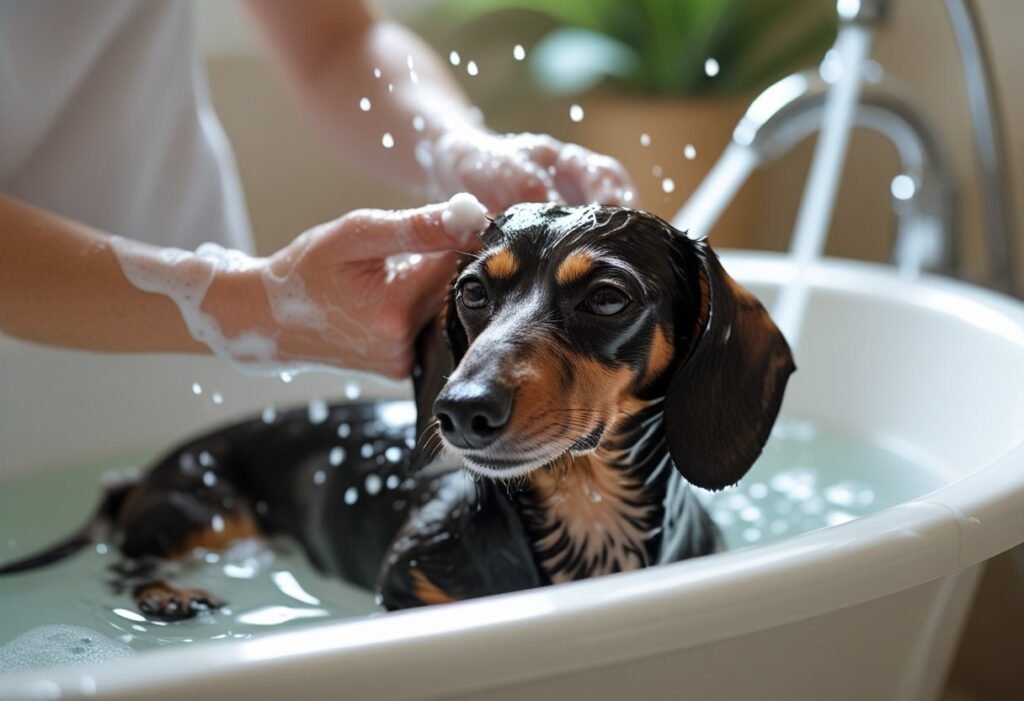
Types of Allergens Affecting Dachshunds
There are a few usual suspects when it comes to dachshund allergies 🔍. The big ones:
- Environmental Allergens: Pollen, dust mites, mold spores, and grass—these can cause trouble if your dog breathes them in or they touch their skin. 🌾
- Food Allergens: Proteins in beef, chicken, dairy, and grains often trigger reactions. 🥣
- Flea Allergies: One flea bite can set off a full-blown itch fest in some dogs. 🐜
- Chemical Allergens: Shampoos, soaps, cleaning sprays, or lawn treatments sometimes irritate sensitive pups. 🧴
Figuring out the trigger is a must. Vets often suggest elimination diets or allergy testing to help you narrow things down 🧪.
Doxie Skin Allergies
Dachshunds are especially prone to skin allergies. These usually show up as red, bumpy, or scaly patches on their belly, armpits, paws, ears, or near the tail 🐾.
Main signs of Doxie skin allergies:
- Intense itching 🌀
- Licking and chewing skin 🦷
- Red or swollen areas 🔴
- Hair loss or thin spots 🧼
If your dog keeps scratching or biting the same spot, infections can pop up 🦠. Look for things like a bad smell, moist skin, or scabs 💧. Regular grooming, flea control, and gentle shampoos go a long way in managing your dachshund’s skin issues 🛁.
Common Symptoms of Allergies in Dachshunds
Dachshunds usually give you some pretty obvious clues when allergies strike 🧐. Symptoms tend to show up on their skin, in their behavior, and sometimes in how they breathe 🐶.
Skin Irritation and Redness
Skin issues are probably the most common allergy sign in dachshunds 🩺.
You might spot red, inflamed patches on the belly, ears, paws, or between the legs 🔴. Sometimes these spots look swollen or feel warm 🌡️. You might see bumps, rashes, or thicker skin where your dog scratches a ton 🤕.
Allergic dogs often lick, bite, or chew at the irritated spots 🦷. This can end up causing hair loss or raw patches. If things get bad, scabs or infections might show up 🧫.
Keep an eye out for changes in skin color or frequent head shaking 👀. Here’s a quick table to help spot skin symptoms:
| Symptom | Where It’s Seen |
|---|---|
| Redness | Belly, paws, ears |
| Swelling | Around eyes, muzzle |
| Hair loss | Legs, tail, flanks |
| Hot spots | Any scratched area |
Spotting these early helps you stop pain and infection before they get worse ⚠️.

🌱 Wild Earth Dog Food – Allergy-Safe, Plant-Based Nutrition
Say goodbye to meaty allergens! Wild Earth offers a clean, plant-based diet that supports allergy-prone Dachshunds with sensitive stomachs and skin.
- ✅ Hypoallergenic formula—no beef, chicken, or dairy
- ✅ Rich in protein, omega-3s, and digestive enzymes
- ✅ Sustainably made, cruelty-free, and vet-developed
Itching and Scratching
Itching is a dead giveaway that something’s up with your dachshund 🌀.
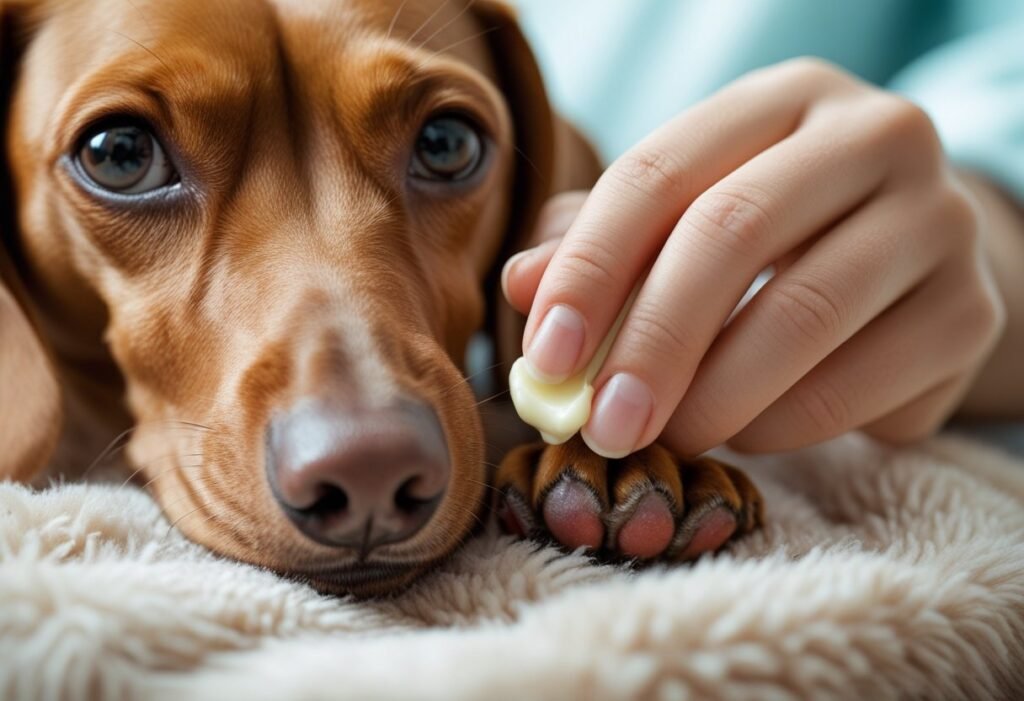
🎉 Grab your free Dachshund care checklist!
You’ll probably see your dog scratching the same areas over and over. Licking their paws, chewing on their legs or rear, rubbing their face on the couch—these all point to itchy skin 🤧. Some dogs get so uncomfortable they whine or can’t settle down 😣.
Keep an eye out for these habits:
- Frequent scratching: Ears, neck, or sides get the most attention. 🔁
- Excessive licking: Usually their paws or lower belly. 👅
- Head shaking: Especially if their ears are bugging them. 🐾
- Rolling: Rubbing their back on the carpet or grass. 🌿
Itching can throw off your dog’s mood and sleep 💤. If your dachshund seems uncomfortable a lot, look for redness, swelling, or scabs 🔍.
Respiratory Signs
Allergies sometimes mess with a dachshund’s breathing or cause nasal issues 😮💨.
You might notice sneezing, coughing, or a drippy nose 🤧. Watery eyes and swelling around the eyes can happen too 👁️. Some dogs make this odd snorting noise called a reverse sneeze when they pull air in through their nose 🤨.
Watch for these signs:
- Sneezing fits: More often than normal. 🌬️
- Nasal discharge: Clear or cloudy stuff coming from the nose. 💧
- Coughing: Usually dry or hacking. 😷
- Watery eyes: Tears or mild puffiness. 😢
Sometimes these symptoms look like a cold 🧊. But if your dachshund’s breathing sounds rough, or the discharge is thick or colored, it’s time to call your vet 📞.
Main Causes of Dachshund Allergies

Dachshunds often get allergies from their environment, what they eat, or parasites like fleas 🐾. You’ll usually see the signs on their skin or in how much they scratch or lick 🤕.
Environmental Triggers
Lots of dachshunds react to stuff in their surroundings 🌳. Pollen, dust mites, mold, even some cleaning sprays can set them off 🧼. You might notice your dog itching more during certain seasons or after walks 🍃.
These triggers often cause red, irritated skin, sneezing, runny eyes, or ear infections 🤧. Some dogs start licking their paws like crazy 🐕.
To help, keep your home clean—vacuum often, wash their bedding, maybe try an air purifier 🧹. During heavy pollen days, wipe your dog’s paws and fur after walks to cut down on allergens 🧻.

🧼 Pride + Groom Sensitive Skin Shampoo
- ✅ Gently cleanses without drying sensitive skin
- ✅ Ideal for dogs with itchiness or rashes
- ✅ Light scent-free formula for allergy-prone pups

🧴 Pride + Groom Conditioner
- ✅ Softens coat without irritation
- ✅ Restores moisture to dry, flaky skin
- ✅ Makes post-bath brushing much easier
Food Allergies
Food allergies usually show up as skin problems or tummy trouble 🥣. The main offenders: beef, chicken, dairy, sometimes grains like wheat, corn, or soy 🌾.

Itching, ear infections, vomiting, or diarrhea are the big signs 🚨. Other times, you’ll just notice your dog’s coat looks dull or they’re gassy more than usual 💨. If you think food might be the problem, try a limited ingredient or hypoallergenic diet 🍠.
Work with your vet on a food trial to figure out what’s causing issues 🩺. Keeping a food diary can help you spot patterns and narrow down the culprit 📒.
Flea and Parasite Allergies
Dachshunds can be super sensitive to flea bites 🐜. Even one flea can cause major itching, redness, and hair loss—usually around the tail base and back legs 😖. The allergy comes from proteins in the flea’s saliva 🧬.
Signs of parasite allergies include scratching, biting, or scabs 🔍. Some dogs get open sores or hotspots if the itching gets out of hand 🔥.
Best way to avoid this? Stay on top of flea treatments and check your dog’s coat often 🧴. Keeping your house and yard flea-free helps too 🧽.
Diagnosing Allergies in Dachshunds

Your dachshund might show signs like itching, sneezing, or ear infections—but honestly, these could come from all sorts of things 🤔. Getting the diagnosis right helps you pick the best treatment for your dog’s specific allergy 🐶.
Veterinary Allergy Tests
Your vet can run a few different tests to see if your dachshund has allergies 🩺. Here’s what they might do:
- Skin Prick Test: They’ll put tiny amounts of allergens under your dog’s skin to watch for reactions. 🧬
- Blood Test: A blood sample can show reactions to things like pollen, dust, or food ingredients. 💉
- Elimination Diet: If food’s the suspect, your vet might have you feed a special diet that skips common allergens, then add foods back one at a time to see what triggers symptoms. 🥣
Each test helps zero in on what your pet’s actually allergic to 🔍. Sometimes you have to repeat tests to be sure. Testing matters because infections or parasites can look a lot like allergies ⚠️.
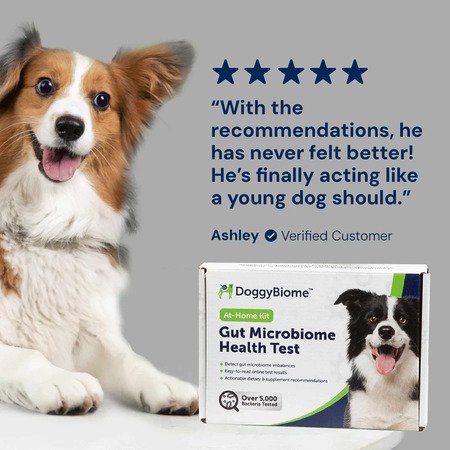
🧪 AnimalBiome Gut Health Test Kit
- ✅ Detects imbalances in your dog’s gut microbiome
- ✅ Personalized insights for targeted allergy care
- ✅ Easy, at-home sample collection kit

🌿 AnimalBiome Gut Restore Supplement
- ✅ Supports immune balance and healthy skin
- ✅ Targets underlying allergy-related gut issues
- ✅ Vet-approved probiotic strains
Differentiating Allergy Types
Dachshunds run into a few different kinds of allergies 📋. The big ones:
- Food Allergies: Usually show up as vomiting, diarrhea, or itchy skin. 🍽️
- Environmental Allergies (Atopy): Things like pollen, dust mites, or mold can set these off. You’ll often notice skin or ear trouble. 🌸
- Flea Allergies: Just one flea bite can make your dachshund miserable with itching and skin flare-ups. 🐜
It really helps to know which allergy you’re dealing with, since each has its own fix 🛠️. Flea allergies? You need relentless flea control. Suspect food? That’s a diet change. Your vet will piece it together from your dog’s story, symptoms, and some tests 🧠.
Treating Dachshund Allergies

Managing your Dachshund’s allergies usually means a mix of meds, tweaks at home, and a little future-proofing 🐾. The plan depends on what sets your dog off and how rough their symptoms get 🧩.
Medical Treatments
Allergy meds can take the edge off itching and swelling 💊. Vets often reach for antihistamines or corticosteroids to calm down reactions 😌. Medicated shampoos are a staple for soothing the skin and washing away allergens 🛁.
Sometimes, your vet will bring up immunotherapy—that’s allergy shots or drops to build up your dog’s tolerance 💉. If scratching leads to skin infections, antibiotics might come into play. For seasonal stuff, regular flea prevention is a must, since flea bites are such a common trigger 🐜. Stick to your vet’s dosing instructions—don’t get creative with meds ⚠️.
Common medicines:
| Medication Type | Purpose |
|---|---|
| Antihistamines | Relieve sneezing and itching |
| Corticosteroids | Reduce swelling and redness |
| Medicated Shampoos | Calm and clean irritated skin |
| Immunotherapy | Build long-term tolerance |

🛏️ Majestic Pet Orthopedic Bed
- ✅ Hypoallergenic fill helps reduce irritation for sensitive skin
- ✅ Supports joints and spine to ease inflammation-related discomfort
- ✅ Removable, washable cover keeps your home allergy-free

🪜 Majestic Pet Stairs
- ✅ Prevents joint strain that can worsen allergy inflammation
- ✅ Carpeted steps trap less dust and are easy to clean
- ✅ Ideal for sensitive Dachshunds who need gentle movement
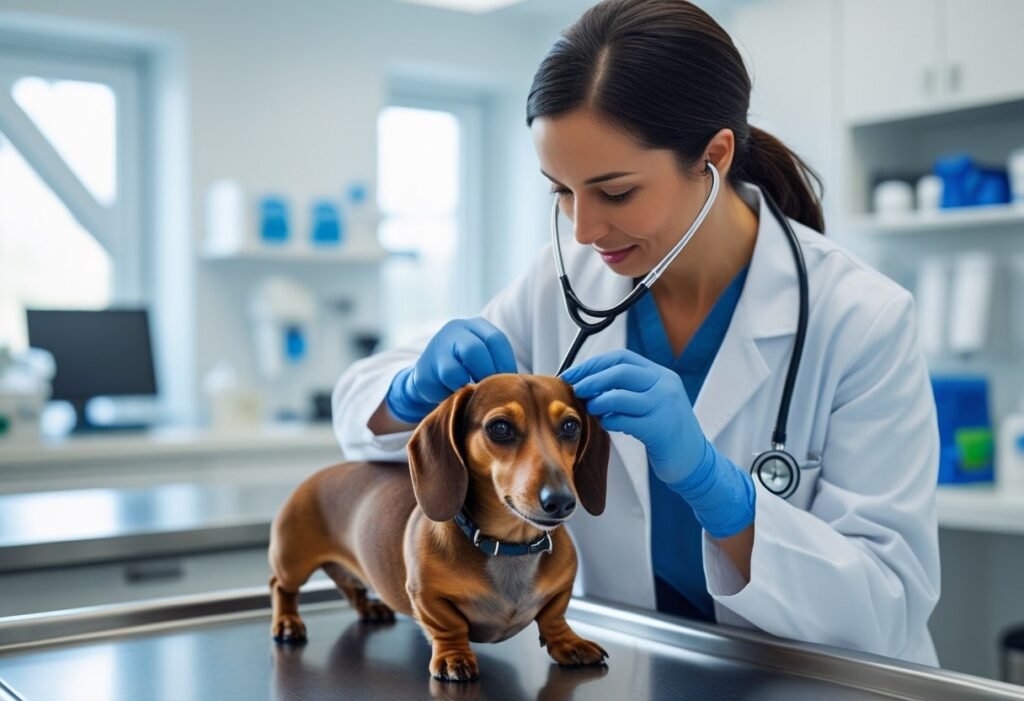
Lifestyle and Environmental Adjustments
Some simple home habits can cut down on allergens 🧼. Wash your Dachshund’s bedding and toys every week 🧸. Keep floors, carpets, and furniture as clean as you can to get rid of dust and pollen 🧹.
Bathe your Dachshund every 2–4 weeks with a gentle, vet-approved shampoo 🐶. When pollen’s high, limit outdoor time 🌿. Air purifiers with HEPA filters can help keep indoor air easier on your pup 🌬️.
If you suspect food allergies, try a high-quality, hypoallergenic dog food 🥣. Watch for any reactions when you switch foods, and always check with your vet about diet changes 🩺.
Long-Term Management Strategies
Your Dachshund might need ongoing care to keep allergies under control 📅. Stick with your vet’s plan and schedule check-ups ✅. Jot down symptoms in a notebook or an app so you can spot patterns 📓.
Make baths and cleaning part of your routine 🛁. If your dog’s condition changes, let your vet know sooner rather than later 📞.
If immunotherapy seems to help, don’t give up early—it can take months, even years, to really kick in ⏳. Always ask your vet before trying new over-the-counter stuff or supplements 💬. Long-term allergy care keeps your dog more comfortable and helps avoid nasty skin problems 🐕.
Home Remedies and Preventive Tips for Dachshund Allergies

You can make a real dent in your Dachshund’s allergy symptoms with some easy changes at home 🏡. Diet, cleaning, and good hygiene go a long way 🧼.
Dietary Modifications
Food allergies aren’t rare in Dachshunds 🍽️. Try limited-ingredient or hypoallergenic foods. Pick ones with a single protein—turkey or salmon, for example—and skip fillers like corn or soy 🌽.
Watch for scratching, upset stomach, or ear problems after new foods 👂. Noticing a pattern? That’s your clue 🔍. Some folks add omega-3s (like fish oil) to cut down on inflammation and skin drama 🐟.
Treats should line up with your dog’s main food 🎯. Avoid table scraps and common triggers like chicken, beef, wheat, and dairy if you notice flare-ups 🚫. If you’re not sure what’s causing trouble, talk to your vet about a food elimination diet 🩺.

🍲 ChefPaw Fresh Food Maker
- ✅ Prepare allergy-safe meals at home
- ✅ Control every ingredient
- ✅ Healthier, tastier, cleaner food

🧠 Brain Training for Dogs
- ✅ Reduces anxiety from chronic discomfort
- ✅ Keeps your dog mentally sharp & calm
- ✅ Positive methods from certified trainer
Grooming Practices
Regular brushing helps keep skin allergies at bay and sweeps away allergens 🧹. Aim for at least twice a week with a soft brush. That gets rid of loose hair, pollen, and dust 🌼.

Bathe your Dachshund every 4–6 weeks (or whatever your vet suggests) 🛁. Always use hypoallergenic dog shampoos—human products are too harsh ⚠️. After walks, wipe down paws and bellies to get rid of whatever your dog picked up outside 🐾.
Check ears and between toes for redness or swelling—they trap irritants 👀. Keep nails short, so scratching doesn’t make things worse ✂️.
Reducing Allergen Exposure
Indoor stuff like dust, pollen, and mold can make allergies worse 🌫️. Vacuum weekly with a HEPA filter vacuum 🧽. Wash bedding and favorite blankets in hot water once a week 🛏️.
On high-pollen days, keep windows shut 🌬️. Air purifiers with HEPA filters can help. If your Dachshund licks or chews certain spots, keep those areas clean and dry 💧.
Non-toxic cleaners are easier on sensitive skin 🧴. Try to limit outdoor time when pollen counts are up 📉. If you can, swap carpets for hard flooring—it’s just easier to keep clean 🧼.
When to Seek Professional Help

Sometimes Dachshund allergies go from annoying to serious, and that’s when you need a vet 🩺. Catching problems early can really change things for your dog 🐾.
Warning Signs of Severe Allergies
Some symptoms mean you should call your vet right away 🚨:
- Severe itching or non-stop scratching 🔁
- Swelling of the face, lips, or eyelids 😧
- Breathing trouble, heavy panting, or coughing 😮💨
- Vomiting or diarrhea that lasts more than a day 🤢
- Red, oozing sores or big patches of hair loss 🩹
If your dachshund suddenly acts tired, weak, stops eating, or hides, that could mean a serious problem ⚠️. Don’t wait it out if these signs show up, especially if things change quickly or get worse ⏱️.
Even one bad symptom can be an emergency 🚑. Fast treatment can sometimes head off bigger problems.

🍽️ Petlibro Automatic Feeder
- ✅ Keeps your Doxie’s meals consistent to prevent allergy flare-ups
- ✅ Airtight design locks out dust, allergens, and moisture
- ✅ Ideal for sensitive pups needing portion-controlled feeding
📍 Tractive DOG GPS Tracker
- ✅ Track your Doxie’s outdoor time to avoid high-pollen areas
- ✅ Get instant alerts if they wander into allergy-trigger zones
- ✅ Lightweight, waterproof, and safe for sensitive skin
Finding the Right Veterinary Specialist
Most allergy care starts with your regular vet, but sometimes you need a pro who’s seen it all 👩⚕️. Veterinary dermatologists handle skin and allergy puzzles 🧩. They can do:
- Allergy testing (skin or blood) 🧬
- Special diets or tailored food plans 🥗
- Targeted meds like immunotherapy or prescription creams 💊
Ask about a referral if your dachshund’s symptoms don’t budge, or if allergies keep coming back 🔁. Some dogs just need an expert’s touch for long-term relief 🧠. Getting the right help really does make allergy management less stressful for both of you 💛.
Long-Term Health Impacts of Untreated Allergies

If you let your Dachshund’s allergies go, it’s not just about itching 😟. Allergies break down the skin’s defenses, making infections way more likely 🦠.
You might catch your dog scratching or licking until they’ve got raw patches 😣. This can cause chronic wounds and sometimes even hair loss 🐾.
- Chronic ear infections 🧏♂️
- Non-stop scratching and chewing 🔁
- Red, thick skin 🔴
- Yeast or bacterial infections 🧫
It’s not just skin-deep, either. Ongoing pain and itching can make your dog anxious or keep them up at night 🌙. Some Dachshunds slow down and just don’t enjoy things as much 😔.
🌿 Allergy Relief & Clean Home Essentials for Your Doxie 🐶
- 💧 Petlibro Water Fountain — Encourage your Dachshund to drink more fresh, filtered water to flush out allergens and stay hydrated.
- 📹 Petcube Cam 360 — Monitor your Doxie’s scratching or allergic behavior while you’re away, and comfort them with two-way audio.
- 🛁 Pride + Groom Grooming Tools Kit — Regular gentle grooming helps remove dander and allergens from your Dachshund’s coat and environment.
- 🍪 Petcube Bites 2 — Reward calm behavior during allergy treatments or grooming sessions and monitor reactions in real-time.
If infections set in, you’ll probably end up needing antibiotics or other meds 💊. Over time, the skin might not heal right, and you could see scars or bald spots that don’t grow back 🧬.
Here’s a quick look at what can happen if allergies go untreated:
| Health Impact | What You Might Notice |
|---|---|
| Skin infections | Sores, pus, scabs |
| Chronic ear problems | Frequent head shaking, odor |
| Hair loss | Bald patches, thinning fur |
| Behavior changes | Restlessness, less playful |
It’s worth keeping these risks in mind—catching allergies early can save your Dachshund a lot of misery down the road ⏳.
Supporting Your Dachshund’s Overall Wellbeing

If you want to help your Dachshund handle allergies, keep their living area tidy 🧽. Vacuum carpets, wash bedding—just basic stuff, but it really cuts down on dust, pollen, and pet dander 🧹.
A balanced diet matters a lot 🍽️. Go for high-quality dog food with good proteins, healthy fats, and fewer fillers. Always check with your vet before adding new foods or supplements—better safe than sorry 🩺.
Get your Dachshund moving every day 🚶♂️. Walks, playtime, whatever works for you both. It keeps them fit and helps with stress 🧠. A puzzle toy here and there for mental exercise? Not a bad idea 🧩.
💛 Allergy Relief & Comfort Essentials for a Healthy, Happy Doxie 🌿
- 🎽 Embark Pet Adventure Harness – Reduce skin friction and irritation with a lightweight, adjustable harness designed for comfort and support during walks.
- 🌿 Innovet PurCBD Oil – Naturally soothes inflammation and itching caused by allergies while promoting overall calmness and balance.
- 🧴 King Klean Dog Shampoo (King Kanine) – Gentle, hypoallergenic formula that cleans and hydrates without triggering skin irritation, ideal for allergy-prone Doxies.
- 🎨 Purr & Mutt Personalized Dachshund Art – Celebrate your clean, comfy, allergy-free pup with a custom artwork that brightens your home.
- 👕 Dog is Good Apparel & Gifts – Share your love for your Dachshund while supporting a positive, pet-friendly lifestyle with stylish apparel and accessories.
🐶 Combine natural care, comfort, and love to give your Dachshund lasting allergy relief and a happier, healthier life.
Stick to a regular grooming routine 🛁. Brush their coat to get rid of loose fur and allergens. Use a gentle dog shampoo—some of them can dry out skin if you’re not careful ⚠️.
Regular vet visits are key for keeping an eye on their health 👨⚕️. If allergy symptoms just won’t quit, ask your vet about allergy testing 🔍.
| Wellness Step | How It Helps |
|---|---|
| Clean environment | Lowers allergen exposure |
| Good diet | Supports immune health |
| Regular exercise | Reduces stress and boredom |
| Grooming | Removes allergens from coat |
| Vet checkups | Finds issues early |
Notice anything new, like odd symptoms? Jot them down 📒. Vets appreciate details—it helps them figure things out faster 🧠.
Skip the harsh cleaners and strong sprays at home 🚫. Those chemicals? They can really bother sensitive pups 🐶.
🐾 Don’t Miss Out!
Download our free Dachshund care guide to keep your furry friend happy and healthy.
Get Your Free Guide 🐶Frequently Asked Questions
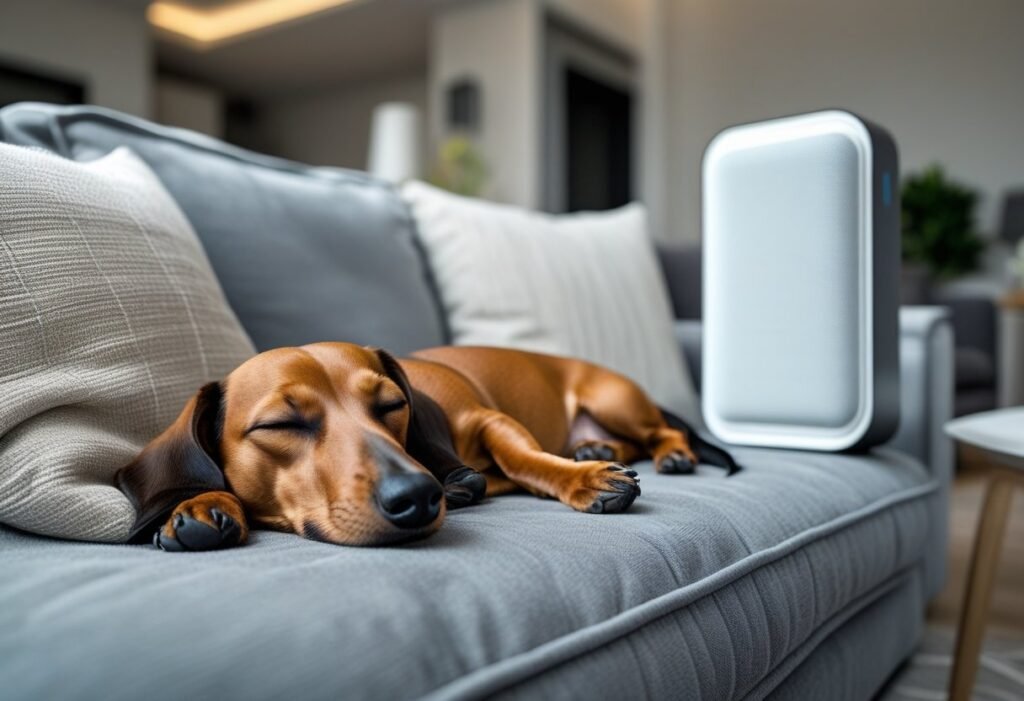
Dachshunds can show allergy symptoms because of food, their environment, or even grooming products 🐶. Figuring out what’s causing the problem and treating it makes a big difference for your dog’s comfort and health 🌿.
What are the common symptoms of allergies in Dachshunds?
You might catch your Dachshund scratching or licking more than usual 🐾. Red skin, hair loss, ear infections, and watery eyes are other signs 👀. Some even sneeze or cough a bit 🤧.
Which allergens are most likely to affect my Dachshund?
Dust mites, pollen, mold, and grass are big ones for Dachshunds 🌸. Certain foods—chicken, beef, dairy, grains—sometimes cause trouble . Flea bites and some shampoos can be triggers too 🧴.
How can I identify if my Dachshund has food allergies?
If your dog’s got itchy skin, ear infections, or digestive issues like diarrhea, food could be the culprit 🍽️. You might need to try a food trial with a special diet for a few weeks to see if things improve 📅. Your vet can walk you through it 🩺.
Are there home remedies effective for treating Dachshund allergies?
Some folks have luck with oatmeal shampoo baths or wiping their dog’s paws after walks 🛁. Clean bedding and maybe an air purifier can help too 🧼. Just check with your vet before you try anything homemade ⚠️.
What steps can I take to manage my Dachshund’s environmental allergies?
Keep your home and your dog’s bedding clean to cut down on dust and pollen 🧹. Wipe their paws after walks, maybe use a HEPA filter 🌬️. If your dog still has symptoms, your vet might suggest meds or special shampoos 💊.
Is there a connection between skin bumps and allergies in Dachshunds?
Yeah, allergies can show up as little bumps, rashes, or even hives on your Dachshund’s skin 🔴. These spots tend to itch, and honestly, things can spiral if your dog keeps scratching or licking them 🔁. Noticed some weird bumps? It’s probably best to check in with your vet just to make sure it’s nothing else 📞.



